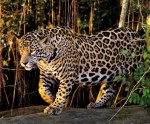
Jaguars are the largest native cat in the Western Hemisphere. They once flourished, but now are endangered thanks to centuries of hunting and habitat loss. The only protected jaguar reservation is in Belize, where they are thriving and drawing tourists, but those cats are separated from other jaguar populations that live (and are declining) in other countries. Jaguar expert Alan Rabinowitz, the CEO of conservation organization Panthera, has a plan to open up pathways to connect various jaguar populations.
Panthera’s Jaguar Corridor Initiative aims to connect 90 distinct jaguar populations across the Americas. It stems from an unexpected discovery. For 60 years, biologists had thought there were eight distinct subspecies of jaguar, including the Peruvian jaguar, Central American jaguar and Goldman’s jaguar. But when the Laboratory of Genomic Diversity in Frederick, Maryland, part of the National Institutes of Health, analyzed jaguar DNA from blood and tissue samples collected throughout the Americas, researchers determined that no jaguar group had split off into a true subspecies. From Mexico’s deserts to the dry Pampas of northern Argentina, jaguars had been breeding with each other, wandering great distances to do so, even swimming across the Panama Canal. “The results were so shocking that we thought it was a mistake,” Rabinowitz says.
Panthera has identified 182 potential jaguar corridors covering nearly a million square miles, spanning 18 nations and two continents. So far, Mexico, Central America and Colombia have signed on to the initiative. Negotiating agreements with the rest of South America is next. Creating this jaguar genetic highway will be easier in some places than others. From the Amazon north, the continent is an emerald matrix of jaguar habitats that can be easily linked. But parts of Central America are utterly deforested. And a link in Colombia crosses one of Latin America’s most dangerous drug routes.
An extensive article at Smithsonian tells of the jaguar’s life in the wild, how this plan came about, and how it might just work -if the many obstacles can be overcome.
 Jaguars are the largest native cat in the Western Hemisphere. They once flourished, but now are endangered thanks to centuries of hunting and habitat loss. The only protected jaguar reservation is in Belize, where they are thriving and drawing tourists, but those cats are separated from other jaguar populations that live (and are declining) in other countries. Jaguar expert Alan Rabinowitz, the CEO of conservation organization Panthera, has a plan to open up pathways to connect various jaguar populations.
Jaguars are the largest native cat in the Western Hemisphere. They once flourished, but now are endangered thanks to centuries of hunting and habitat loss. The only protected jaguar reservation is in Belize, where they are thriving and drawing tourists, but those cats are separated from other jaguar populations that live (and are declining) in other countries. Jaguar expert Alan Rabinowitz, the CEO of conservation organization Panthera, has a plan to open up pathways to connect various jaguar populations.
No comments:
Post a Comment